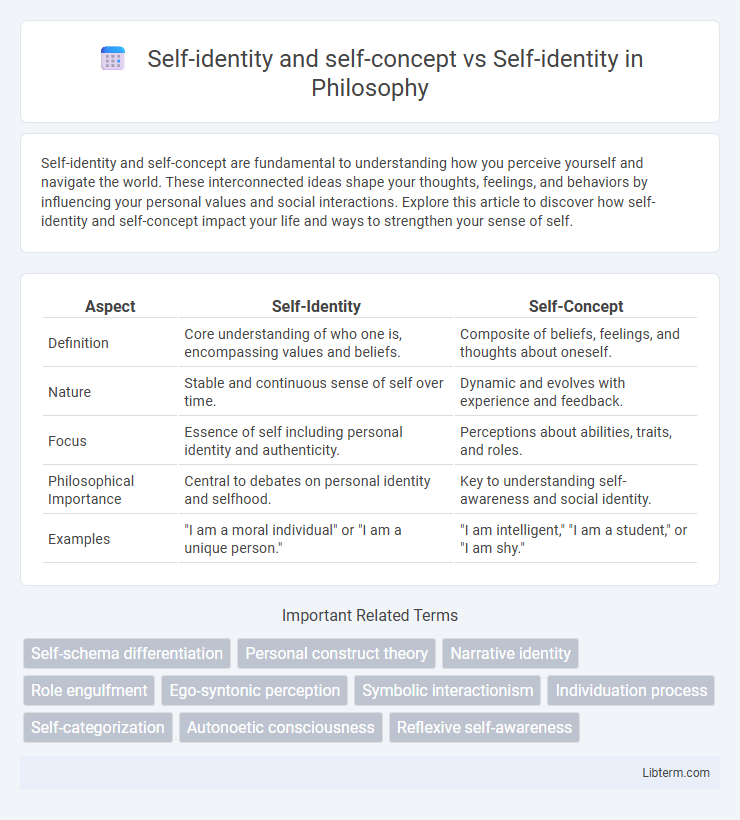Self-identity and self-concept are fundamental to understanding how you perceive yourself and navigate the world. These interconnected ideas shape your thoughts, feelings, and behaviors by influencing your personal values and social interactions. Explore this article to discover how self-identity and self-concept impact your life and ways to strengthen your sense of self.
Table of Comparison
| Aspect | Self-Identity | Self-Concept |
|---|---|---|
| Definition | Core understanding of who one is, encompassing values and beliefs. | Composite of beliefs, feelings, and thoughts about oneself. |
| Nature | Stable and continuous sense of self over time. | Dynamic and evolves with experience and feedback. |
| Focus | Essence of self including personal identity and authenticity. | Perceptions about abilities, traits, and roles. |
| Philosophical Importance | Central to debates on personal identity and selfhood. | Key to understanding self-awareness and social identity. |
| Examples | "I am a moral individual" or "I am a unique person." | "I am intelligent," "I am a student," or "I am shy." |
Understanding Self-Identity: Definition and Importance
Self-identity refers to an individual's understanding and perception of themselves, encompassing personal attributes, beliefs, and values that define who they are. It plays a crucial role in shaping behavior, influencing decision-making, and fostering psychological well-being by providing a coherent sense of self. Recognizing the distinction between self-identity and self-concept is essential, as self-concept broadly covers all the ideas one holds about oneself, while self-identity emphasizes the core aspects that form one's unique personal narrative.
Exploring Self-Concept: Core Components
Self-identity centers on the recognition and understanding of one's distinct existence, while self-concept encompasses a broader framework including beliefs, emotions, and perceptions about oneself. Exploring self-concept reveals core components such as self-esteem, self-image, and the ideal self, which collectively shape how individuals interpret their personal experiences and social roles. These elements influence behavior, motivation, and the integration of social feedback, highlighting the dynamic interplay between internal self-perception and external identity formation.
Differences Between Self-Identity and Self-Concept
Self-identity refers to the overarching sense of who a person is, encompassing consistent traits, values, and roles that define individuality over time. In contrast, self-concept is a broader collection of beliefs and perceptions about oneself, including attributes, abilities, and experiences that fluctuate depending on context. Key differences lie in self-identity's stable, unified core, whereas self-concept is multi-faceted and dynamic, reflecting how people see themselves in various situations.
The Interconnection of Self-Identity and Self-Concept
Self-identity and self-concept are deeply interconnected psychological constructs that shape an individual's understanding of who they are. Self-identity refers to the internalized sense of self shaped by personal experiences, social roles, and cultural background, while self-concept encompasses the cognitive and evaluative perceptions one holds about oneself. This interconnection influences behavior, motivation, and emotional well-being by integrating self-perceptions with social identity frameworks.
Factors Influencing Self-Identity Formation
Self-identity encompasses the overall understanding of who we are, shaped by self-concept, which includes beliefs, emotions, and values about oneself. Factors influencing self-identity formation include cultural background, social interactions, and personal experiences, which together mold an individual's perception of self. Neuroscientific studies highlight that self-identity evolves through brain plasticity responding to environmental influences and psychological development.
The Role of Culture in Shaping Self-Concept
Culture profoundly influences self-identity by shaping individual self-concept through shared values, beliefs, and social norms that define personal and collective identities. Cultural contexts guide the internalization of roles and expectations, thereby affecting how individuals perceive and evaluate themselves within their social environment. Understanding these cultural dimensions reveals the dynamic interplay between self-identity and self-concept, emphasizing the importance of cultural frameworks in constructing personal meaning and social belonging.
Self-Identity vs. Self-Perception: Key Distinctions
Self-identity refers to the enduring sense of who a person believes they are, shaped by personal values, cultural background, and social roles. Self-perception involves the process of interpreting one's own behaviors and experiences to form an understanding of oneself in the moment. The key distinction lies in self-identity's stable, overarching view of the self, while self-perception is a dynamic, situational interpretation influenced by external feedback and internal reflections.
The Impact of Social Interactions on Self-Identity
Social interactions play a crucial role in shaping self-identity by influencing how individuals perceive themselves and their place within social contexts. Feedback, social comparisons, and role expectations experienced during interactions contribute to the development and reinforcement of self-concept, which encompasses beliefs, feelings, and attitudes about oneself. The dynamic relationship between social experiences and self-identity underscores the importance of external validation and social connectedness in forming a coherent and stable sense of self.
Developing a Strong Self-Concept for Personal Growth
Developing a strong self-concept is essential for personal growth as it involves a clear understanding of one's values, beliefs, and abilities, which shapes self-identity. A well-defined self-concept provides a stable foundation for decision-making and resilience in the face of challenges, fostering confidence and emotional well-being. Cultivating self-awareness and reflecting on personal experiences enhance self-identity, enabling continuous growth and meaningful life changes.
Practical Strategies to Strengthen Self-Identity
Self-identity encompasses the complex perception of oneself, integrating personal values, beliefs, and roles, while self-concept specifically relates to the cognitive evaluation of one's abilities and traits. Practical strategies to strengthen self-identity include consistent self-reflection, setting achievable personal goals, and seeking feedback from trusted sources to align self-perception with reality. Engaging in mindfulness practices and journaling fosters deeper self-awareness, promoting a cohesive and resilient self-identity over time.
Self-identity and self-concept Infographic

 libterm.com
libterm.com